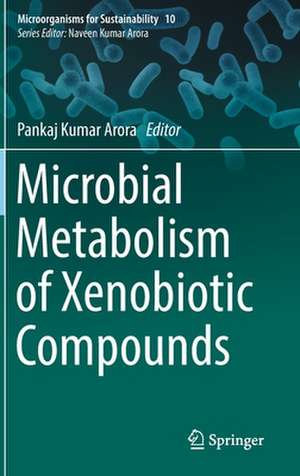Microbial Metabolism of Xenobiotic Compounds: Microorganisms for Sustainability, cartea 10
Editat de Pankaj Kumar Aroraen Limba Engleză Hardback – 2 oct 2019
| Toate formatele și edițiile | Preț | Express |
|---|---|---|
| Paperback (1) | 644.18 lei 6-8 săpt. | |
| Springer Nature Singapore – 2 oct 2020 | 644.18 lei 6-8 săpt. | |
| Hardback (1) | 650.37 lei 6-8 săpt. | |
| Springer Nature Singapore – 2 oct 2019 | 650.37 lei 6-8 săpt. |
Din seria Microorganisms for Sustainability
- 24%
 Preț: 794.72 lei
Preț: 794.72 lei - 18%
 Preț: 952.57 lei
Preț: 952.57 lei - 24%
 Preț: 1033.06 lei
Preț: 1033.06 lei - 24%
 Preț: 967.12 lei
Preț: 967.12 lei - 18%
 Preț: 1219.63 lei
Preț: 1219.63 lei - 24%
 Preț: 1196.29 lei
Preț: 1196.29 lei - 24%
 Preț: 1193.04 lei
Preț: 1193.04 lei - 18%
 Preț: 1229.10 lei
Preț: 1229.10 lei - 18%
 Preț: 1118.62 lei
Preț: 1118.62 lei - 18%
 Preț: 949.73 lei
Preț: 949.73 lei - 18%
 Preț: 1229.10 lei
Preț: 1229.10 lei - 24%
 Preț: 834.63 lei
Preț: 834.63 lei - 18%
 Preț: 1392.95 lei
Preț: 1392.95 lei - 18%
 Preț: 1117.82 lei
Preț: 1117.82 lei - 18%
 Preț: 1004.99 lei
Preț: 1004.99 lei - 24%
 Preț: 808.32 lei
Preț: 808.32 lei - 18%
 Preț: 948.61 lei
Preț: 948.61 lei - 18%
 Preț: 951.14 lei
Preț: 951.14 lei - 15%
 Preț: 643.48 lei
Preț: 643.48 lei - 18%
 Preț: 947.67 lei
Preț: 947.67 lei - 24%
 Preț: 793.30 lei
Preț: 793.30 lei - 18%
 Preț: 947.35 lei
Preț: 947.35 lei - 18%
 Preț: 1383.81 lei
Preț: 1383.81 lei - 24%
 Preț: 783.41 lei
Preț: 783.41 lei - 18%
 Preț: 948.79 lei
Preț: 948.79 lei - 24%
 Preț: 1052.02 lei
Preț: 1052.02 lei - 18%
 Preț: 1227.67 lei
Preț: 1227.67 lei
Preț: 650.37 lei
Preț vechi: 765.14 lei
-15% Nou
Puncte Express: 976
Preț estimativ în valută:
124.44€ • 129.93$ • 102.100£
124.44€ • 129.93$ • 102.100£
Carte tipărită la comandă
Livrare economică 04-18 aprilie
Preluare comenzi: 021 569.72.76
Specificații
ISBN-13: 9789811374616
ISBN-10: 9811374619
Pagini: 344
Ilustrații: XIII, 357 p. 54 illus., 21 illus. in color.
Dimensiuni: 155 x 235 mm
Greutate: 0.69 kg
Ediția:1st ed. 2019
Editura: Springer Nature Singapore
Colecția Springer
Seria Microorganisms for Sustainability
Locul publicării:Singapore, Singapore
ISBN-10: 9811374619
Pagini: 344
Ilustrații: XIII, 357 p. 54 illus., 21 illus. in color.
Dimensiuni: 155 x 235 mm
Greutate: 0.69 kg
Ediția:1st ed. 2019
Editura: Springer Nature Singapore
Colecția Springer
Seria Microorganisms for Sustainability
Locul publicării:Singapore, Singapore
Cuprins
Microbial Degradation of Pyridine and Pyridine Derivatives.- Anaerobic Biodegradation of Pesticides.- DNA Stable Isotope Probing to Examine Organisms Involved in Biodegradation.- Enzymatic Bioremediation: Current Status, Challenges of Obtaining Process, and Applications.- Biotransformation of Heavy Crude Oil and Biodegradation of Oil Pollution by Arid Zone Bacterial Strains.- Catalytic Promiscuity of Aromatic Ring-Hydroxylating Dioxygenases and Their Role in the Plasticity of Xenobiotic Compound Degradation.- Aromatic Compounds and Biofilms: Regulation and Interlinking of Metabolic Pathways in Bacteria.- Polychlorinated Biphenyls (PCBs): Environmental Fate, Challenges and Bioremediation.- Bioremediation of Polycyclic Aromatic Hydrocarbons (PAHs): Current Practices and Outlook.- Microbes Are Essential Components of Arsenic Cycling in the Environment: Implications for the Use of Microbes in Arsenic Remediation.- Biodegradation of Synthetic Pyrethroid Insecticides.- Microbial Degradation of Polyethylene: Recent Progress and Challenges.- Biodegradation of Polychlorinated Biphenyls.- Role of Macrofungi in Bioremediation of Pollutants.- Microemulsions as a Novel Tool for Enhancing the Bioremediation of Xenobiotics.- An Overview of Nitro Group-Containing Compounds and Herbicides Degradation in Microorganisms.- Distillery Effluent: Pollution Profile, Eco-friendly Treatment Strategies, Challenges and Future Prospects.
Notă biografică
Dr. Pankaj Kumar Arora is working as an Assistant Professor and DBT-Ramalingaswami Re-entry Fellow at the Department of Environmental Microbiology, Babasaheb Bhimrao Ambedkar University, Lucknow, India. Dr. Arora is also serving as an Editorial Board Member for Scientific Reports, a journal of Nature Publishing Group, an Associate Editor for Frontiers in Microbiology and an Academic Editor for PLOS ONE. He is a recipient of several national awards and fellowships including Young Botanist Award (2012) of Indian Botanical Society, Dr. Y. S. Murty Medal (2015) of Indian Botanical Society and Ramalingaswami Re-entry fellowship (2018) of Department of Biotechnology. His specialization area is Environmental Microbiology and Biotechnology and currently, Dr. Arora is working on biodegradation and bioremediation of various xenobiotic compounds including nitrophenols, chlorinated nitrophenols and indole. He completed his postdoctoral studies from University of Hyderabad, MJP RohilkhandUniversity, Bareilly and Yeungnam University, South Korea. He has total 36 publications in reputed journals and has eight years teaching and research experiences at national and international reputed institutes.
Textul de pe ultima copertă
Xenobiotic compounds including pesticides, nitrophenols, pyridine, polycyclic aromatic compounds and polychlorinated biphenyls are widely spread in environment due to anthropogenic activities. Most of them are highly toxic to living beings due to their mutagenic and carcinogenic properties. Therefore, the removal of these compounds from environment is an essential step for environmental sustainability. Microbial remediation has emerged as an effective technology for degradation of these xenobiotic compounds as microorganisms have unique ability to utilize these compounds as their sole source of carbon and energy. The primary goal of this book is to provide detailed information of microbial degradation of many xenobiotic compounds in various microorganisms.
Caracteristici
Provides in-depth knowledge of microbial degradation of various xenobiotic compounds, sustainable and green approaches in environment Explains various metabolic pathways of various pollutants Addresses the most recent subject as resurrection of polluted resources is one of the biggest targets at present Well supported with several illustrations, figures and tables so that the readers can understand and relate with the presented work
